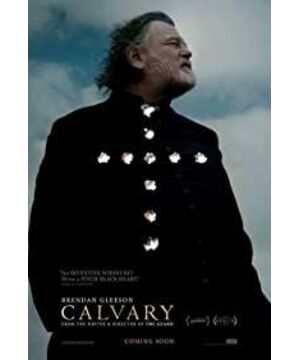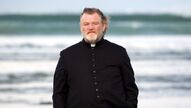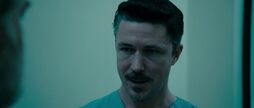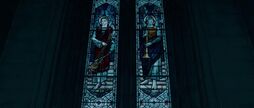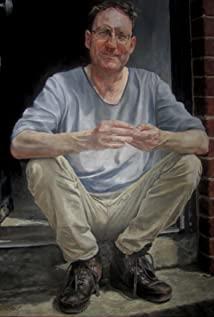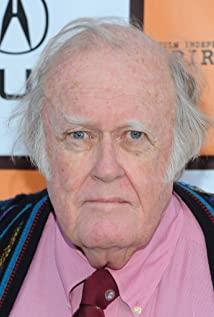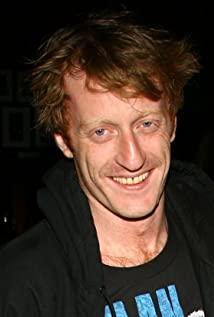Micheal: The sacrificial boy who steals wine, the two figures in the painting magically predicted the ending, and also become a kind of psychological hint that disaster will eventually come. On the last beach, Micheal, who was a bit rebellious but still cherished with a childlike heart, reminded Jack of his childhood, but the final hope the director gave the audience vanished in an instant. His little figure running wild on the beach and the loud warning after the priest was injured reflect the existence of proper ethics between the church and children.
Father Leary: The epitome of a clergyman who has lost his faith, he is a servant, alienated from the believers, and lacks a sense of responsibility. He is more like a faithful salesman of the church, thinking and acting more from the perspective of the church, rather than out of love or love for the believers. Responsibility, so he turned a blind eye to racial discrimination, and his demeanor was completely discouraged in front of the powerful. When parting, the priest’s evaluation of Leary was sharp and interesting: It's just the thing that you have no integrity, that's the worst thing i can say about anybody. When a priest is more like an accountant or selling insurance, he is really angry. He feels that his faith has been insulted. People who truly lose their faith will not be so sensitive. Look at the mocking faces everywhere in the town. Know it. In the revolving lantern at the end of the film, Leary, who was drunk by the priest, held the theology books in the church and meditated. Anyway, he at least realized that there was a problem with his faith, just like the last kind blessing the priest gave him: Hope you will find what you are looking for, good luck.
Bishop: This may be the worst character in the whole film. Even Jack is cuter than him. At least he has a sympathetic encounter. And the bishop is simply a parasite who loves to do nothing, is arrogant, greedy, and has no compassion. He not only ignores the general communication, but also ignores the life and death of the priests around him. The sentence The choice is yours is really damning. After meeting with the priest for the second time, after Datong’s high-level and meaningless preaching, I couldn’t help asking for the murderer’s name. Recalling that the first meeting was irrelevant to my high-minded behavior, it was really sacred property of the church. Infringement, please ask for blessings for the priest's life.
Fiona: The priest’s baby daughter, slender, sensitive, and childish. A period of growing up lacking parental care has honed her and also caused her a lot of problems. She was trapped in love and returned to her father after committing suicide. She thought that she would finally regain the warmth of the family, but she did not expect What was waiting for her was another farewell to life and death in an unsuspecting disaster. Fiona can be called the most tragic character in the play. She is more innocent than the priest. In the face of suffering, the priest has at least the opportunity to escape (regardless of whether he violates her faith), and Fiona, who lost her father twice, has no choice at all. Moreover, she is not a priest, and she does not have the obligation to endure hardship to save others. What is commendable is that with the delicate body of an ordinary woman, she survived the unimaginable pain of ordinary people, followed the last teachings of her beloved father, and completed the most difficult forgiveness in the show at the end of the film, forgiving for being called again. And the father who left without saying goodbye forgave the murderer who personally snatched his father from her. As an ordinary viewer, compared with the many difficulties of the saints’ martyrdom, the suffering of family affection suffered by Fiona can make us feel more empathetic, and love is mutual. How much suffering Fiona has endured, the priest must have endured the same suffering or even more. It is precisely because of the existence of the role of fiona that all the depression, hesitation, anxiety, and guilt experienced by the priest in the last week can be transmitted to the hearts of the audience through a more straightforward and more mundane way, which brings us greater shock and also makes The martyrdom of the priest reveals a more tragic color beyond religious value.
Veronica Brennan: She has a similar life trajectory to Fiona. She lost her father when she was young, her mother was bossy, her husband was a gloomy lunatic, and she recently started domestic violence. Well, her situation looks even worse. Her belief status also showed strange contradictions. On the one hand, she attended Mass, received the sacrament, and confessed her sins like a religious believer. On the other hand, she was like an incurable blasphemer, taking drugs, Openly commit adultery and mock the sanctity of religion. In fact, she didn’t want to be redeemed, but the misfortune of her childhood and the unsatisfactory life made her not believe that she could be redeemed, just as she said to the priest I'm a lost cause on the beach, and at the same time, she solved the priest’s teaching. A button on the chest of the robe. At lunch, she ran into the priest while going out to hang out with Simon. She provocatively confessed to the priest that she was about to commit adultery, claiming that confession could not solve the problem, because the crime had already been committed and the dust settled. She hoped that the priest would be able to To stop her before she was about to commit a crime, the priest said: You have to stop yourself, I can't stop you. She replied: Then what good you at all. She blamed her sins for failing to stop her The priest and the religion itself who committed the sins did not know that although she herself had hopes, she no longer believed in the things she hoped for. She did not believe in the promises of God and could only miss the long-awaited redemption time and time again, gradually returning to hopelessness. Belief is ultimately the experience of the self, which can be guided by the outside world but cannot be imposed. This is also the reason why the priest's love cannot be helped. Nevertheless, the priest always thinks that Veronica can be saved. He has taken the initiative to advise her on more than one occasion, hoping to rekindle the conscience and belief in her heart (the priest is not a pedantic old school, he ran to the beach to talk to her after he discovered that Veronica was taking drugs. , He had nothing to expect from Dr. Frank Harte), the irony is that the priest’s efforts failed to save Veronica, and at the same time he failed to save herself, because Veronica’s blatant adultery was the result of Jack’s final physical and mental collapse and shooting the priest. One, again, the victim is not the one who committed the crime.
Jack Brennan: This is a disgusting character, but we can't criticize him. After all, saints are a minority, but it's a pity. In the end, he still failed to forgive, thinking of heaven and hell. As an innocent person who was violated, he was burdened with terrible trauma and endured silently for many years. Finally, one day, all kinds of evil thoughts sprouting around made him unable to hold on to his beliefs. He decided not to restrain his own vengeance and to harm him. Another innocent person, to end the endless torment in his heart. First of all, the pleasure of retaliation was the first time of domestic violence. (When the priest asked Simon, he said that Jack was not like someone who would do this kind of thing. Jack could calm down and play chess with Simon in the tavern. It can be seen that he was not a bad temper. People), and then closed his eyes in front of the burning church with a happy expression of contentment (it is intriguing that it was the fire truck that Jack called by himself. Whether it is a guilty conscience or a guilty conscience, he has always been a symbol of a strong church here. He was undoubtedly stepped on his feet for a moment, it turned out that revenge was not difficult), and then directly attacked the priest’s faith in the bar (So you sure there is a god there father?) to the last hundred and pulled the trigger of sin (he experienced It was a hesitation and struggle, because he tried to persuade himself to kill the priest for a legitimate reason, not for revenge in a secular sense. In the end, the reason he inspired himself was that the priest did not have enough compassion for what happened to him. And he was in awe of the soldiers who had never met on the battlefield far away, so his behavior was no longer revenge, but the judgment of the pious against the ungodly). It took Jack a week to turn his ten years of forbearance and hard work into nothing, and he fell into an endless abyss ever since.
Simon: Brother Ivory Coast, the Irish may really be accustomed to racial discrimination. His sensitivity to racial remarks, dislike of church authority, random trampling of precepts, and ridicule of beliefs, this setting really teaches people to be speechless. .
Brendan Lynch: The fat owner of the bar was very dissatisfied with the government and even the church because of the financial dispute with the bank. He also criticized the priest's usual teachings. After witnessing the church arson, he was inspired and maliciously killed the priest's dog bruno. , The next day the depressed priest came to the bar to drink his sorrows the next day, seemingly remorseful. In the end, he received a burst of old punches from the priest by accident, and he received the punishment he deserved. His most glorious line is the line Your church is on fire!, the puns are exquisite and exquisite.
Milo Herlihy: A dull and handsome guy who lacks the opposite sex. Although a bit weird, he is definitely a kind man in such a bizarre town. His troubles are very simple, and the way out is very straightforward. Either he ends up or joins the army to reshape himself. In the dialogue between him and the priest, he does not evade that he does have a murderous intention. At least the path he chooses will generally not hurt. Others, this is commendable. There is a very interesting scene of milo. The scene where the priest and his daughter danced. Milo was originally eager to invite Fiona to dance, but he didn't expect that Fiona and the priest would be happy. In order to hide his embarrassment, he bounced and left. It's a detail that makes people laugh. The director of this scene has a lot of small actions. At first, Veronica and Jack were sitting together. Veronica took out her mobile phone and kept playing with her. Jack glanced at her uneasyly at his wife. In the next shot, Simon looked at the mobile phone and smiled knowingly. The inside and outside scenes are all done well. Before the father and daughter danced, the priest told Fiona to be careful of the doctor. Fiona raised his head high and said with a smug expression: I gave up cocaine long~~ time~~ ago. The priest replied coldly and warmly: You took cocaine? The expressions of the two of them were really joking.
Michael Fitzgerald: arrogant, rich, and self-lost financier. He drifted away from everything around him, his heart swelled but purposeless, and his spiritual world had no support. After experiencing the disintegration of his family, he intends to donate a sum of money to the church, not so much as an atonement, but more like alms. I feel like I ought to feel guilty. The implication is that I don’t really have any guilt, but as a person standing at the top of the financial world, this level of guilt is just a kind of self-consciousness and an obligation for me. . It is a pity that the donation did not help to alleviate the confusion and emptiness in his heart. When he wandered about the cliff, he finally let go of his arrogance, sincerely repented, received the priest's forgiveness, and reopened the door of faith. There is an official poster about the scene of Fitzgerald's salvation. In the middle is the back of the priest and Fitzgerald facing the sea. In the distance, there is a rainbow just falling on the priest's shoulder, like an oracle, pardoning sincere regrets through the hands of the priest The sinner seems to be comforting the audience. Although the gunshots whirled on the beach, the various sufferings suffered by the priest were not in vain, and God was with him.
Inspector Stanton: The high-level policemen who colluded with the church witnessed the corruption of the church, so his faith is not strong, and he even thinks that the present faith will prove to be absurd and ridiculous in the near future, and is hypocritical to Father Leary. The faction is dismissive, and at the same time, because of his dealings with criminals, he is also incomprehensible for the priest’s forgiveness of prisoners. But what is strange is that none of the above prevents him from becoming one of the few people in the small town who treats the priest with kindness (in the painting version) In the poster, the title lists the sentence I'm going to kill you father..., below is a hand-painted plot character, including Stanton and Teresa), the night when the priest borrowed the gun, he told the priest when he parted The sentence Protect urself for all time is enough to make the bishop embarrassed. This is the true kindness of human nature, and it is much stronger than those hypocrites who use the cloak of faith to pretend to themselves.
Leo: Male prostitute. With a cross hung on his chest, he was busy between the beds of all kinds of people, unaware of the abnormality of his life. On the night when the priest was out of control, Leo was the last person who wanted to help. He never thought he would say Feeling fine. He refused the priest's kindness without hesitation. This was probably also one of the incentives for the priest to leave the next day. Everyone in this small town was depraved, rebellious, and indulged in pathological daily life. No one yearned for salvation. The priest felt that there was no meaning to persevere. In the final flashback, Leo sat naked on the edge of the bed, like a sculpture of a thinker. I wonder if he finally noticed his confusion; the bright red color of the bedding in this shot is intriguing, does it imply that the bishop is sleeping soundly on the couch Adults.
Teresa: The widow of an oceanographer who died in a car accident, pious, perseverance, fraternity, gratitude, and a bright heart. Teresa has concentrated too many believers' virtues, like an unextinguished night light in the dim and gloomy faith swamp of the small town , Bring a hint of light and warmth. Ironically, the only unparalleled believer in the town who survives is a stranger. The director used her dialogue with the priest to discuss faith with the audience straightforwardly, such as this famous line about the loss of faith But what is faith, for most of people is just the fear of death. If nothing more than that, if that's all the thing is, it's very easy to lose. This phrase used by the priest to comfort Teresa, but in the end it should be on the priest himself, is it a true word? To be honest, the character of Teresa shows a certain degree of unreality because of being too perfect. Perhaps this is the plot that the director deliberately neutralizes the overly heavy plot. Perhaps compared to the thought-provoking enlightenment she conveyed to the audience, Teresa The characterization of itself is actually not that important.
Dr. Frank Harte: Atheist, doctor. Because of the professional relationship, they lost respect for life, questioned the existence of God, and thus lost faith and all the moral constraints brought about by faith. Belief is not completely equated with cognition of the world. It should include the praise of good and the derogation of evil. Doctors deny their view of good and evil while denying religion’s cognition of the world, and even produce rebellious psychology. Challenge the authority of religion everywhere. He told the priest at the entrance of the hospital I have to go kill somebody. In fact, he was just pulling out the breathing apparatus of the dying oceanologist, but he deliberately used the word kill to show off his relapse. You know, for the audience, The phrase SHOULD NOT KILL the priest admonished milo in the church is still in my ears. Just because he completely abandoned the concept of right and wrong, and abandoned the awe of life, it is not difficult to imagine his restless and self-destructive life, just like the sharp evaluation of the priest-I think you may be finished NS.
Freddie Joyce: Perverted murderer, vainly trying to gain a certain self-divine by depriving others of their lives, but he only saw the authority of God, but he couldn't see the thorns on the crown of God. At the end of the visit, he asked the priest: God made me, didn't he? So he understand me, he must do. God shapes all beings, understands all beings, and forgives all beings. For the penitent, God will not close the door of heaven, but atonement is not easy. Freddie once asked the prison to hang himself, just like when he killed the last girl. Although there is no death penalty in Ireland, this is not just his beautiful words. Meet in heaven, when he will use his sincere love to make up for his mistakes. However, at the end of the film, he is lying on the ground suffering bullying by other prisoners, with remorse, hope and anxiety for redemption, praying ceaselessly, and exhausting his entire life.
Writer: An old writer, looking forward to a decent death. Conscious that time is running out, he asked the priest for a pistol so that he could end himself beautifully when he could not bear the torture of death. However, the Catholic Church does not approve of suicide, so the priest still does his best to help him live better in his last days. In this small town, the worries of the writer are the most "normal", the cycle of birth, old age, sickness and death, no one can escape. Facing death, this weird-tempered writer is definitely not cowardly. There was a sense of cynicism. In the days waiting for the god of death, the elder writer unconsciously had all kinds of observations on the imminent death. As his only friend, the priest naturally became the object of his pouring, but he did not know that the speaker had no intention of listening, and those words were in his body. There were bursts of bitter resonance in the ears of the distressed priest, which made people feel helpless. There is a special detail about the writer. In the whole film, everyone in the town calls the priest Father. Only two people have called him by his real name. One is the condescending bishop and the other is the writer. Before the priest went to the beach, he ran into the writer. When he said goodbye, he praised the writer in an uncharacteristic manner. You are a very fine writer. The writer who is used to quarreling with the priest suddenly felt a little overwhelmed, and replied with a little shame and gratitude, Thank you, James . In the priesthood, he taught countless great principles to the residents of the town, usually regarded as nonsense, unhelpful, and even ridiculed; but at the moment when he decided to face death, a simple sentence without any moralistic color Encouraging words, but let him be truly accepted by the residents for the first time, this kind of contrast seems to be ridiculous, but it is thought-provoking. In the current era, not only the people's beliefs have problems, but the religion itself also needs self-analysis and reflection.
bruno: The priest's pet dog, the same time limit is approaching. Bruno can be called a golden supporting role, and every scene in the film is impressive. When he first appeared on the stage, he lay tiredly on the priest's bed. After the priest returned, he kissed it affectionately, burying his face in the white hair of his neck. When I met Fiona at the station and introduced my pet dog, the phrase This is bruno, the upbeat tone may be the priest's most angry line in the entire movie. The priest drove bruno and fiona on the small road by the edge of the field. The composition of the whole picture is beautiful and fascinating. After bruno's accident, the choked priest digs a grave for it, haggard figure against the yellow kerosene lamp. When sending her daughter to leave the town, Fiona forgot to say goodbye to Bruno. The priest said with a strong smile, I'll give him a big kiss for you. After the daughter turned and left, he couldn't keep the smile that disappeared suddenly.
Father James Lavelle: Devout priest, terrible father. As a clergyman, his integrity is almost impeccable. Perhaps his occupational disease can only be counted as eloquent and unforgiving. However, unexpectedly, such a respectable priest has not received what he deserves in a small town. Veronica called him the "Grand Inquisitor" and considered the priest too sharp to this parish, and the fat bar owner called him the boss. All kinds of people have an inexplicable hostility towards the priest. They should be used to influence and lead. The "good" of the believers' faith is surrounded, repelled or even corroded by the secular "evil". The situation of the priest may be a microcosm of the declining religious belief in reality. Compared to the priest's glorious image in religion, his performance as a father at the same time is not so commendable, at least in a secular sense. The death of his wife made him called to join the church, but it also made him abandon the helpless fiona. Regardless of his original intention, the harm to his daughter was real. Facing fiona’s questioning, the priest justified himself in this way: I was never neglectful, I don't think, never hit you or anything. Words are as sharp as a priest, but there is a moment when there is a poor word. Even not beating your daughter has become the standard of a loving father. This almost rascal justification reveals that it is him Deeply ashamed of my daughter. The interweaving of the two identities in the same person creates the problem that the fish and the bear's paw cannot have both. This dilemma has tortured the priest's faith from beginning to end. There is peace in the world, and the Tathagata will not bear the Qing, but the acquisition of faith is never easy, and there is no shortcut. In the face of hardship, the priest finally decided to bear the heavy cross, bid farewell to his beloved daughter, and set foot on redemption. Journey, this is the victory of faith.
Other:
Father’s Passion Week:
This is a film that is easy for viewers to misunderstand. Its introduction, classification, posters and even the first half of the slow laying out make the audience spend most of the film in a slightly curious and inattentive mentality, until the gun The moment the sound rang, the huge emotional impact made the mind blank for a moment. With the floating states slowly flowing on the screen, the various struggles, shakes, and sufferings experienced by the priest who had been deliberately ignored before seemed to slowly emerge before his eyes. At this time, the original unremarkable dialogue became puns everywhere, making people re-examine the hard and cruel test the priest has endured this week. From beginning to end, the priest knew that this was not a joke, and he did not have any tricks or powerful allies that could turn the world around. In short, the priest did not have all the naive fantasies that the audience had, and he faced only truth. The real fear and helplessness of death. The reason why the priest reacted so fiercely to the child with a medical malpractice that the doctor told in the tavern was because this story happened to be a true portrayal of his own situation, desperate and unable to ask for help; the priest’s situation was even worse than that of the child, sick Children have no right to choose. There is always a way out for priests, that is, to give up their faith and bow to death. For priests who always defend the dignity of their faith, this seemingly flowery way out is really a sea of flames. Compared with the fear of death, they refuse to give birth. The temptation is more cruel.
The priest is also a mortal. Although he has the consciousness of a clergyman, his fear of death is out of nature, and no one can overcome it. To make matters worse, the villagers knew nothing about the priest's situation and often talked about life and death in front of the priest, which made the worried priest even more depressed. This type of dialogue focused on three people, the writer, the widow, and the daughter.
When I first met the writer, the priest asked him how he was doing. The writer answered At death door, you? The priest replied Same. It seemed casual, but it was the truth. Visiting the cemetery with the writer (this incident alone is enough to upset the priest), the writer asked the priest why he didn’t give him a pistol, and the priest said Idoits dont bother killing people for no reason these days. The writer countered Some people have very good On the one hand, the worries and worries in the heart are almost exposed, and on the other, the accomplices of ghosts and gods are excused. The priest also hopes that someone can listen to him and share his worries, but the only bishop who has the power to listen cannot count on it, but he has to do it to others. It is impossible to tell the secret of the murderer, so I can only hear such unintentional but hurtful words.
The conversation between the priest and the widow seems to be the priest’s enlightenment to the widow, but in fact it is the mutual inspiration of two faithful believers. The priest said that Everybody knows it's coming. But even if he knows this, even if he is prepared, he still cannot face death calmly. Never easy. These two sentences are undoubtedly referring to himself, and the discussion about losing faith not only encourages the widow to cheer up and face adversity bravely, but also the priest's spur on himself. The true faith is not easily lost due to the threat of death. . After that, the widow’s understanding of fairness is awe-inspiring, That is not unfair, that is what just happened. But many people don't live good lives, they don't feel love, that is quite unfair, I feel sorry for them .Achieve true open-mindedness because of equal love for others, and face the misfortunes of life calmly. This sentence also touched the priest. The experience he faced at the time was also very unfair. Kindness and piety, never making mistakes, would cause himself to be killed. It is really unacceptable, but think about the hardships in life. People who can’t feel love, think about the murderer who was humiliated in their childhood. Fate is truly unfair to them. If you really lose your life on the beach, it’s just happened, that’s all. So the priest invited the widow to reciting the eulogy, both for her dead husband and for herself who is about to set foot on Calvary. In fact, when the last tragedy was staged on the beach, what I remembered was the widow’s sentence That is not unfair, that is what just happened. This is probably the greatest relief the director left to the audience.
The conversation with my daughter is the most sad. There are two main paragraphs. The first paragraph is in the confession room as a priest to exhort the daughter to cherish her life. The priest said But what about those you leave behind? The daughter answered I belong to myself,not to anybody else. The priest subconsciously answered True. Because he knew that he might be about to die, this kind of statement is also a kind of self-anaesthesia for him. Life is his own, and he does not need to be responsible for others. It does not take his own life to risk it. What do you owe your daughter. But he immediately realized that he should correct his daughter’s one-sided view, let her fear life and go back to the right path. After hesitating, the priest replied False. This sentence not only negated his daughter’s view, but also broke him. The self-hypnosis that has just been established, my choice is not just my own business, it is likely to bring the daughter's indelible pain again, which makes the priest fall into irrepressible self-blame and grief. The simple two words reveal that The five flavors in the priest's heart are endlessly mixed. After this unsuccessful attempt, the priest once again persuaded his daughter at the beach, this time as a father to resolve the shadow in her heart. Together, they cherished the memory of their daughter’s mother, a strong and stubborn woman. This is the priest’s feeling and said I dont know if i will be brave when the time comes. , Self-repressive call for help. Then the daughter asked the priest to promise to guard her forever and never leave her. The priest pressed his daughter and his chest and said I will always be here, and you will always be here. The daughter nestled in her father's arms happily, but the sadness behind the scene made people unable to look straight.
About the black robe soutane:
The costumes of the two priests in the film are not the same. Leary wears a black uniform with a Roman collar, while the priest wears a black old-fashioned robe. Fitzgerald once asked him what he always wears old-fashioned black robe, whether he wants to pass the costume. Express something. The changes in clothing may have alluded to changes in the expression of the clergy and even the church's ideas, becoming more secular, utilitarian, more mechanical and indifferent, while the helping and caring heart of the priest has gradually become a move beyond the boundary. On the other hand, the conversation between the priest and Leary talked about how the clergy can deal with the troubles of the believers. You have to detach yourself from it. We're here to provide solace. Your personal feelings don't come into it. Religion is a transcendental perspective. In the end, the murderer asked the priest if he shed tears for the children who were abused in the news. The priest can only honestly deny it. This reminds me of Teresa’s I feel sorry for them. Even though they can sympathize with those who have never suffered, the clergy is indifferent to the crimes committed by their colleagues because of the professional habits of detechment. The black robe has become an invisible barrier. It cannot be said that it is a great irony.
Suicidal people:
The film is full of people with all kinds of suicidal tendencies. The writer, Milo, and Freddie Joyce all yearn for death more or less. The priest’s daughter is a suicide attempter. Even the priest himself seems to be trapped in it. He is resting in the countryside. I dreamed that everyone in the town pointed their guns to their heads, and the last figure that flashed past was the priest himself. Out of self-preservation, he borrowed the pistol from Stanton, but never made up his mind on how to use it. In the church, Milo asked him if it is an offense to defend and kill people. The priest hesitated to answer It's a tricky one all right. Standing in the audience's perspective The priest’s behavior is no different from suicide. During the confession, Fiona even told the priest that Jesus had committed suicide. For this reason, the priest called the Japanese writer smart ass angrily. From a religious point of view, the priest’s death is a kind of redemption for the sins of the world, just like Jesus used his own blood to wash away the original sins of mankind, and in the end, all the people who had aspirations to death have survived, and the one who committed to the faith. The priest who rescued others died. As a mortal, the price of salvation was too heavy.
Regarding the two thieves:
Do not despair; one of the thieves was saved.
Do not presume; one of the thieves was damned
.
The repentant thieves in the Bible say: And we indeed justly; for we receive the due reward of our deeds: but this man hath done nothing amiss. This is probably the origin of the director's endowment of the murderous manual machine, and it is also the highest summary of the whole plot.
beach:
At the end of the film, the priest’s martyrdom site is a beach. The strong sea breeze from the Atlantic Ocean whizzes by. This should be a place of sorrow and despair, but the song The Beach in the original soundtrack is not heavy at all. On the contrary, it appears quiet and peaceful. Serenity, the ocean gave birth to the first life, representing the motherhood of the world. The priest finally fell on the white-waved beach, like a saint in the embrace of the Virgin. The same tranquility, peace and serenity, only the sound of the waves silently washes away the sins of the world. .
Hail Mary, full of grace,
the Lord is with thee;
blessed art thou amongst women,
and blessed is the fruit of thy womb, Jesus.
Holy Mary, Mother of God,
pray for us sinners,
now and at the hour of our death .
Amen.
View more about Calvary reviews


